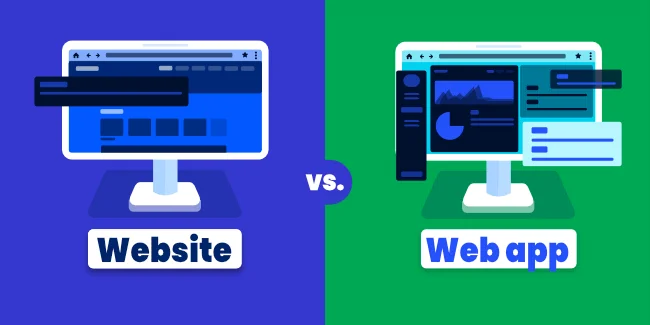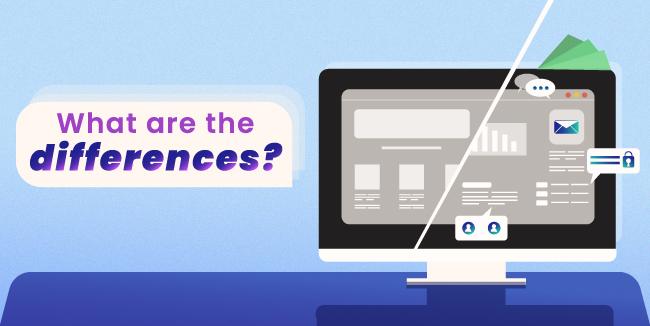webdevelopment
webapp
website
webapplication
webapps
Website vs. Web Application - What's The Difference?

Many companies, when deciding to create a website on the web, have a problem with making a decision - a website or web application. It's understandable why it's so difficult. Both may be accessed from your browser; both require an internet connection, and both are responsive. What distinguishes them, and how can you determine which one is superior?
As a software development company, we have implemented this type of project for many years, confirmed by our wide portfolio. Before we start any project, we first talk to the client to get to know and understand the goals of this project. We advise our clients when deciding whether it is better to create a website or web application and select a tech stack that directly impacts the software project budget and timeline.
We hope you find the following article helpful and will help you decide.
Website - What is This?
A website is a collection of web pages linked under a domain name and hosted on a single or multiple web server with a unique IP address. Users may access a website from various platforms such as phones, PCs, laptops, tablets by opening their browser and entering the domain name or clicking on a link.
Most of the websites you navigate currently rely on a CMS (content management system) and the rest are usually custom.
The biggest advantage of websites is that they save time and money. Websites are not overly expensive, they are quite simple to create. Also, their maintenance and operation do not pose any major problems.
They are an ideal option to browse information, therefore some of the most popular sites are news sites such as CNN.com, MSN.com, or Wikipedia.com. Those well-known informational websites contain static content.
Web Application - What is This?
A web application is a kind of an online tool that may be accessed from a browser and saved on a server. In order to use it, you'll need an active internet connection. Unlike mobile apps or desktop software to which web app is similar in appearance, you can access it via a link and don’t need to download it from a store and install it on your device.
The popularity of web applications has grown thanks to the Software as a Service (SaaS) movement. They provide a wealth of options that go beyond informing and can be used as a service in themselves. Web applications may be free, but there are also paid versions.
The web app can be utilized on any platform – Linux, Windows, and Mac as they all support modern browsers. As well as they are adapted to be used in any mobile web browser.
Most frontends of modern web applications are developed with languages like HTML, CSS, and Javascript, which are supported by most browsers. While the backend might be any programming language such as LAMP, MEAN, or others.
A web application is generally responsive and depends on user interaction. It will also adapt to the screen size of the device from which you access it, such as a smartphone, a laptop, or a desktop.
Unlike websites, the majority of web applications are dynamic and require server-side processing.
A web app's primary goal is to assist a user in completing a certain action, such as viewing online courses, tracking business costs, or managing advertising accounts. These programs are frequently created using browser-supported technologies and architectures like HTML, React.js, Vue.js, Laravel, and Node.js.
What Are The Differences Between Them?

A website is required to showcase your company and offer items to the public. You'll need a web application if you want an online tool to assist you to automate a number of processes.
If you build a web application and want to sell it, you would probably need both because a website helps you promote the product you just created.
A website doesn’t usually have functionality as it is just a group of globally accessible, interlinked web pages, so if you want people to register on your website, then you need a website with web application functions, for example, user authentication.
It's best to start comparing and discovering the differences between a website and web application by explaining how they work and what distinguishes them.
Website
- It's visual and text-based content that users can see and read, but it has no effect on the application's operation.
- No authentication is needed. Some features are blocked for unregistered website visitors, but you can still view some without entering your details.
- Easy to use, displayed on a single page, usually containing information in the form of text and graphics.
- It is a complete product. At the time of posting its content on an internet domain, it can be accessed through a browser.
- The website doesn’t need to be pre-compiled.
- If you need to make changes to the code, you can do it right away. All you need is HTML editing.
- They can be opened by almost any device with Internet access.
Web App
- To communicate, web applications require user input and interaction through restricted data.
- It needs authentication, as they offer a much broader scope of options. User accounts on web applications usually contain sensitive data, therefore these accounts must be properly secured. Verification is used for this purpose. often it is just a matter of entering the login and password, the match can be multi-stage
- Great variety and complexity of functions. Some operations require more RAM memory.
- Web application development is part of the website. It's not a complete website itself.
- Before deployment, the site must be compiled.
- All changes require recompilation and deployment of the entire project.
- They are usually created with desktops in mind but are usually also supported by mobile devices. The big advantage is that they don't need mobile app store approval to function properly.
What Are the Features of the Website?

Upsides
- The development process is super easy. As it is often made just from HTML code it can be made by a single developer.
- Its simplicity means that there is little room for errors. That is why websites are known for their reliability.
- It's certainly much less expensive than a web app.
- The website is extremely multi-platform accessible. Adapting it to many types of devices is not a difficult task, and various devices have no problems opening the page, even if it is not suited to them.
Downsides
- Simplicity has both benefits and drawbacks. The uncomplicated website structure creates big limitations. Users can not interact with the website. Its activity mainly comes down to browsing.
- Due to the need to manually update the data, there is a chance that some information on the website will be outdated.
- If you use pre-made contact forms without filtering capabilities, you may receive a lot of unwanted spam messages.
- Web apps often don't need any additional intervention, but if one of your business goals is to rank your website high in the rankings, you need to update it regularly.
What Are the Features of the Web Application?

Upsides
- SaaS applications can be used with most browsers and will run uniformly on any operating system regardless of the update or version used.
- Content in web applications can be easily customized for use on a variety of devices such as mobile phones. This makes the application user and developer-friendly.
- It's easy to launch and deploy web app across the company. Once the application is installed on the host server, access is granted.
- Unlike mobile or desktop applications, the user does not have to manually update the software of web applications. By entering the web app, the client receives the most up-to-date version of the tool.
Downsides
- The web app, in comparison to a website, takes more time and is typically more expensive. It all depends on the specific demands of the situation and the level of advancement of each solution.
- If you need an advanced web application, you need to know that its development time will be much longer than building a simple, static website.
- It requires a lot of effort. Developing web applications, you'll need strong developers with experience in both the frontend and backend.
- They may appear different and not function as intended on older web browsers. The application developers must thoroughly test it in order to prevent this.
Websites or Web Apps - What is for what?

Once the differences are cleared up, much of the uncertainty has already become clear. However, this is not the end of the road in properly preparing the choice between a website and a web app. A website, for example, is used to inform users about the firm's goods and services. A web app on the other hand is more interactive, it allows you to interact with the displayed material in more ways.
The major business aim of every web application is to give personalized service and satisfy consumers' requirements. Their aims may vary, depending on the demands.
Modern websites are typically seen as a "digital business card" from a commercial standpoint. Its primary goal is to provide information about the firm and contact information. The main aim of web pages is to attract a potential client who may use your services or buy your product.
Web apps are flexible in their ability to accomplish a wide range of activities. Customers may use web pages to place orders, make wishlists, and inquire about goods or services. Employees may also use apps to communicate, collaborate on common projects, edit documents, and share files remotely. This is critical in the new era of remote work.
What Websites and Web Apps Should I Know?
Sometimes we may not know it, but we encounter both the website and the web application on a daily basis. It may be at work, school, or just browsing the internet on a mobile device. It is worth getting to know the possibilities of those we use in order to use them effectively and more productively.
Examples of Websites
mDevelopers - This is our website, from it you will learn what we specialize in and what we can help you with. You can also browse our blog where we regularly publish articles about IT, business, and technology. We cordially invite you there.
Loftgarten - It specializes in creating high-quality experiences through creative directions, architectural visualizations, motion designs, and virtual reality. Thanks to its stunning design, it has been awarded in many design competitions.
Wikipedia - I don't think you need to present this page to anyone. Wikipedia is an online encyclopedia that contains an amazing amount of information due to the fact that content can be created by everyone, because of that it is worth double-checking some information.
Examples of Web Applications
Google Docs - It is a remarkably useful tool from Google where we can create text documents, spreadsheets, presentations, forms, drawings, and much more. All this can be on your Google Drive, so you can share these documents with other colleagues.
Netflix - One of the most famous streaming platforms. On it, we can find and watch our favorite series, movies, and programs.
Meta - That is, from Facebook through Instagram to WhatsApp. all these web apps were made to be functional. You can edit the content in it, for example, insert photos or videos.
Summary
It’s the game of tech entrepreneurs to build a web application, but having a website at this time is almost essential for any company. As the web development world is complicated sometimes, and we hope that our thorough guide brought some light to the websites and web applications dilemma.
As the best product development company, we have extensive experience and knowledge that we love to share. If you want to discuss your project with our specialists, arrange a free consultation. We guarantee that you will be satisfied!